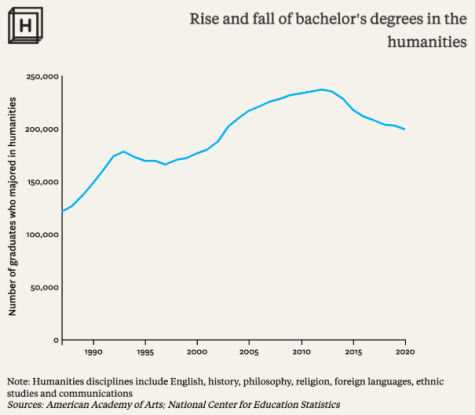Is The Humanities Field ‘Endangered’ ?
May 2, 2023

In the 2020-21 school year, Humanities majors experienced a drop in graduate percentage across the United States. This marks the thirteenth consecutive year that the field has steadily declined in numbers. Historically speaking, Humanities has been a field that has fluctuated in graduates time and time again. As of late, the dramatic shift in numbers has become more blatant. The amount of Bachelor’s degrees in the humanities has been steadily decreasing by the tens of thousands since 2010, which is the most the field has ever lost. And what’s more, it doesn’t seem as if there is any room for optimism as any net growth in the field doesn’t seem to be happening.
So, what could be the reason behind all of this? Why are the humanities endangered?
“There’s this perception that it’s not as wise an investment as technology, at the same time that the cost of college has exploded,” said Nicole Hill, Valencia College Humanities Professor.
Hill is one of the many faculty members of Valencia College that have led and contributed to the college’s Humanities Speaker Series which includes an annual roster of writers, thinkers, artists, activists and scientists to speak at Valencia College.
“And then you take into consideration that politically, there’s been less enthusiasm to support the humanities,” said Hill. “There’s been less investment in public universities and public colleges that offer a liberal arts array of classes in the last 50 years, and a lot of these state institutions are tuition-dependent. They depend on enrollment. If students aren’t majoring in humanities but somewhere else, they (the government) will perceive that they will ‘meet the students where they want us,’ rather than require them to take the classes that lead to a balanced education.”
Another potential reason for the struggle amongst the Humanities field could be the lack of any focused programs for the major. Humanities and Film Studies Professor Jed Broitman, graduated with a Bachelor’s in Humanities from Florida State University and Master’s in Liberal Studies from Rollins College, had some insight to provide on this conundrum.
“In Valencia College, we had nine credits just a few years ago. They removed that requirement because the state removed that requirement, so now you’re only required to do six. That’s a knock on anybody who’s wanting to do any additional Humanities work.” Broitman went on to say that some departments across the country have disappeared altogether as some believe that there’s no value in the programs.

Likewise, Broitman also elects to bring up the flawed thinking in downplaying the humanities. “If you’re going to living and working in a Zoom environment or in a working space, I want to work with somebody who is well-rounded; who has an interesting narrative and actually appreciates my culture and even their own culture as opposed to people who are simply just solving for x all the time,” said Broitman.
“Certainly that gets things done, but the world of artificial intelligence (AI) and technology is changing by the hour. Many of the items that we were using a decade ago aren’t used anymore. So I think that the narrative should be flipped; more people should be in the Humanities so that they could differentiate themselves from the next person. STEM and the Humanities go hand-in-hand.”
Concern around this phenomenon is common, as the consequences of a lack of concentration on the humanities could overall lead to a more compliant and ignorant society.
Eric Wallman, Valencia Professor of Humanities and Philosophy, has a Bachelor’s in Humanities and Master’s in Liberal Studies from Rollins College Hamilton Holt School, sums up the problem quite nicely. “Context and relevance. The fewer people that get the context and relevance of Humanities’ impact, it’s going to lead us deeper into that situation where societally humanities can be everywhere around us, and there’s no appreciation for us,” Wallman said. “There’s many situations today where you look at and go ‘Geez, the humanities would really help in that situation.’ There’s the controversy of some of the debates that happen in school boards regarding books or art lessons. These controversies pop up everyday in the news, and you have to wonder if the people who are upset or pushing these issues are versed in the Humanities.”
When asked for some insight or advice for aspiring Humanities majors, Wallman had more to say. “I wouldn’t advise anyone to just stop at their Bachelor’s degree,” Wallman said. “If you really, truly think you’re going to go to graduate school and you really love it, keep pursuing it. You will find something that you’re passionate about, that you’ll do for a job. And if you don’t see the potential to become a PhD in it, do something else or double major.”
Not only that, but there is optimism to be had for Humanities majors after college. According to an article published by David M. Perry of CNN News, History majors have a lower unemployment rate than Economics majors, and English majors in their 20’s do better than Computer Science majors. CEOs are interested in hiring liberal arts majors to give their companies a liberal arts background, with successful CEOs such as Starbuck’s Howard Schultz and Walt Disney’s Robert Iger. Economists claim that narratives matter just as much as numbers. While commitment to the field of Humanities is necessary, it’s imperative to not be dissuaded, as it is a proven fact that Humanities is everywhere around us.
Dean of Humanities Eric Wallman reminds students that while getting a job is important, doing something you love is just as paramount. “Get something that’s employable, but also love the humanities because it’s in your heart.”





b • May 5, 2023 at 6:31 pm
No